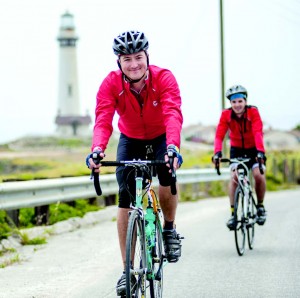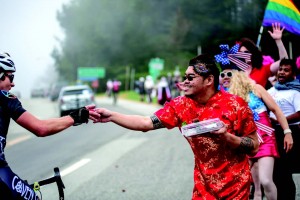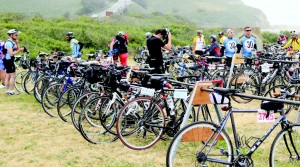On Sunday, May 31, more than 3,200 people from 46 states, Washington, D.C. and 21 countries will embark on a life-changing journey. It’s the 14th annual AIDS/LifeCycle, a 545-mile, 7-day bike ride that raises awareness and critical funding for the HIV prevention and care services of San Francisco AIDS Foundation and the Los Angeles LGBT Center.
Every year, people from different backgrounds, regions, and countries—of different ages, body types, and levels of fitness—come together to form a special community. There’s something about this experience that forms a unique bond between strangers who become friends. AIDS/LifeCycle is the story of people coming together to make a difference in the fight against HIV/AIDS.
Some come to AIDS/LifeCycle for the physical challenge or the experience of riding a bike across some of the most gorgeous parts of the Golden State. Others participate in honor of a friend they lost to AIDS, or because they themselves are living with HIV. Everyone comes for a different reason, but by the end of the week, we are all part of the same community doing something amazing to raise a lot of money and a lot of awareness. Last year, AIDS/LifeCycle participants raised over $15.5 million, making the event the largest, single-event fundraiser for HIV/AIDS in the world.
 In the days before AIDS/LifeCycle begins, 2,500 cyclists and 700 volunteer “Roadies” arrive in San Francisco geared up for the experience of a lifetime. Roadies dedicate their week to supporting the ride—they’re the ones who make everything possible. As you can imagine, moving 3,200 people 545 miles across California is no small feat. Because of these dedicated, passionate, and spectacular volunteers, this event is able to keep costs low—which means more funding for the cause.
In the days before AIDS/LifeCycle begins, 2,500 cyclists and 700 volunteer “Roadies” arrive in San Francisco geared up for the experience of a lifetime. Roadies dedicate their week to supporting the ride—they’re the ones who make everything possible. As you can imagine, moving 3,200 people 545 miles across California is no small feat. Because of these dedicated, passionate, and spectacular volunteers, this event is able to keep costs low—which means more funding for the cause.
And Roadies certainly have their work cut out for them. Over the course of seven days, AIDS/LifeCycle participants will consume 125 cases of bananas, 2.2 tons of oatmeal, 660 gallons of milk, 3.1 tons of vegetables, and 1,200 pounds of pasta.
Each night, participants stop at a designated campsite in cities along the route: Santa Cruz, King City, Paso Robles, Santa Maria, Lompoc, and Ventura. In each community, local residents come out to cheer from the roadside with banners and costumes that broadcast their support.
The views are breathtaking. The route is both flat and hilly, weaving in and out of valleys and inlets along coastal roads. Participants, on average, train for more than six months before the event, and each day on AIDS/LifeCycle is physically rigorous with emotional, maybe even spiritual, moments.
 Of the 1.1 million people living with HIV in the United States, one in 10 live in California, and over five thousand people will become newly infected with HIV this year in our state alone. In fact, California has the most new HIV infections of any state in the country. The fight against AIDS has changed so much over the last thirty years, but it’s not over.
Of the 1.1 million people living with HIV in the United States, one in 10 live in California, and over five thousand people will become newly infected with HIV this year in our state alone. In fact, California has the most new HIV infections of any state in the country. The fight against AIDS has changed so much over the last thirty years, but it’s not over.
Thanks to advancements in science, medicine, education and advocacy, someone diagnosed with HIV today has the chance to live a healthy, productive life with access to treatment and care. That’s why organizations like the Los Angeles LGBT Center and San Francisco AIDS Foundation are so critically important.
AIDS/LifeCycle changes people’s lives. Not only does the experience change the lives of our participants, but by making HIV prevention and care programs possible, AIDS/LifeCycle participants save the lives of thousands more.
This event is much more than a bike ride. It’s a movement. It’s a movement that will not stop until HIV/AIDS is a thing of the past. And it’s something everyone should experience at least once.
 AIDS/LifeCycle 2015 starts in San Francisco on May 31 and ends in Los Angeles on June 6. Experience the event virtually at http://bit.ly/alc15ete
AIDS/LifeCycle 2015 starts in San Francisco on May 31 and ends in Los Angeles on June 6. Experience the event virtually at http://bit.ly/alc15ete
AIDS/LifeCycle 2016 will take place from June 5–11, 2016. Find out more at aidslifecycle.org
Greg Sroda is senior director of AIDS/LifeCycle. He’s also a long-time participant having completed five rides as a cyclist and eight rides as the “roadie” captain for Rest Stop 4. This is his fourth year leading the event. AIDS/LifeCycle is produced by San Francisco AIDS Foundation and Los Angeles LGBT Center. All proceeds benefit the HIV prevention, support, and care services of the two agencies.
Recent Comments